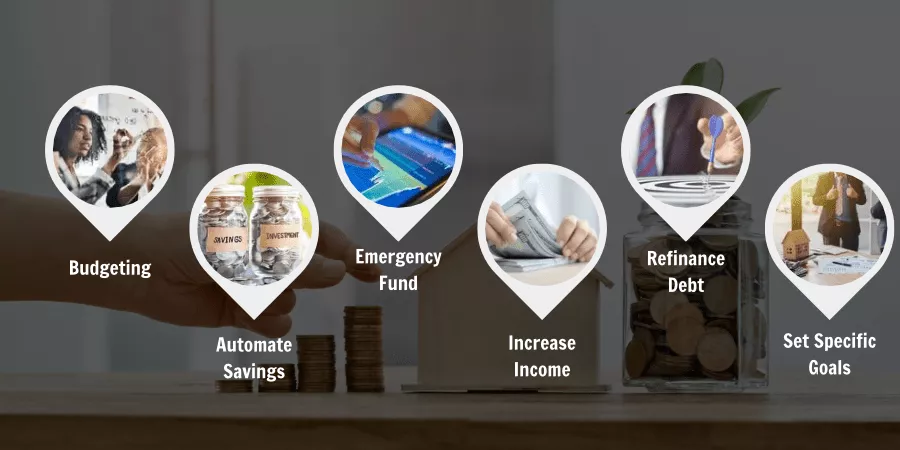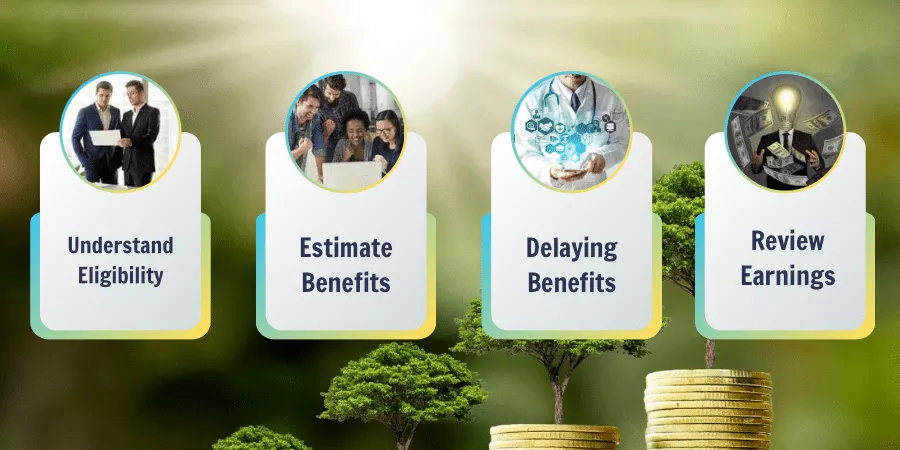Approaching retirement can often spark a mixture of excitement and uncertainty. Did you know that more than half of Americans with a solid retirement plan feel very confident about achieving their financial retirement goals? Our article will guide you through key steps such as assessing your finances, augmenting savings, planning for Social Security, strategizing taxes, and managing healthcare costs to ensure a smooth transition to retirement your golden years.
As you approach retirement, it’s important to carefully consider what you want to retire. Reflect on your passions, hobbies, and financial goals for this next phase of life.
Let’s sail toward your retirement dreams of a secure retirement together!
Key takeaways
● Know your net worth by adding up what you own and subtracting what you owe.
● Save for retirement, make extra savings if you are above 50 years old.
● Make your retirement plans for when to take Social Security payments.
● Look forward to taxes in retirement and think about changing your IRA to Roth.
● Have money set aside for health costs after retirement.
● Count all the ways money could come in during retirement; include pensions too!
● Figure out how much of your saved money will be used every year once retiree.
● Try paying off loans before retiring or change some things to lower interest rates.
● Choose where one will stay during life as an elderly man or woman based on likes, lifestyle changes, weather etcetera; think about the living cost there as well.
● Think of working more years or taking on a job even while being a pensioner. This adds more cash which brings comfort while leading life after work cessation!
● Draft legal documents like a Will so that one's wealth is protected and secure with heirs' future assured post-retiree's passing away!
Assessing Your Current Financial Status
Understanding your current financial position is a vital first step when approaching retirement. To accomplish this, calculate your net worth by subtracting liabilities from assets.
Evaluate what you own (assets) and what you owe (debts or liabilities). This will offer a clear picture of where you stand financially, helping guide future retirement planning decisions effectively.

Calculate Your Net Worth
Find out how much money in retirement you have. Add up the value of things you’ve own, like your house and car. Also, add the cash in your bank accounts and any stocks or bonds you own.
Next, subtract what you owe such as mortgage or credit card debt.
This gives you your net worth. Tracking net worth over time helps to see if it goes up or down.
Understand Your Assets and Liabilities
You need to know what you own and owe. Your assets include cash, stocks, bonds, real estate, and individual retirement accounts like 401(k) or Roth IRA. Liabilities are your debts like mortgage payments and credit card debt.
Subtracting liabilities from assets gives you net worth. Make a list of all these things to clear your financial picture.
Pay close attention to how each asset can help in retirement. For example, a Roth IRA allows tax-free withdrawals after age 59 and a half if the account is at least five years old. Also, note any debts that may hang into your golden retirement years.
Plan ways to lower these debts before retiring for peace of mind.
what to do when approaching retirement plan
When approaching retirement, there are several important steps to take to ensure a smooth transition and financial security.
First, assess your current financial situation, including savings, investments, and any outstanding debts. Work with a financial advisor can be instrumental in securing your financial future.
Enhancing Your Savings
It’s integral to boost your retirement account contributions for a more secure future. Remember, if you’re eligible, making catch-up contributions can add more to your personal savings and provide larger income in retirement.

Boost Your Retirement Account Contributions
Start saving for more can lead to a happier retirement. Here are some tips to increase your savings:
- First, add more money into your 401(k) account. Try to save as much as your job will match.
- Next, start think about an IRA. This is good if you put the most you can in your 401(k) and have extra to save.
- Spread out where you save money. Have some in accounts that give tax planning help and some in normal cash accounts.
- If your taxes are low now, use a Roth account. This lets you pay less tax when you take out money later.
- But, if your taxes are high now, grow your money where it won’t get taxed until later.
- Think about changing savings into a Roth IRA before retiring if you plan on having higher taxes later on or want to leave no-tax money for loved ones after passing away.
- Lastly, always check with your job about 401(k) matching and change how much you save based on what they provide.
Consider Catch-up Contributions if Eligible
Saving more for retirement is important. Catch-up contributions can help with that. If you’re age 50 or older, think about making them.
- Catch-up contributions are extras. They go on top of your regular savings.
- They give good tax breaks. This helps your savings grow faster.
- Some plan for retirement allow catch-up contributions. Check if yours does.
- Use automatic paycheck cuts to save more easily.
- For those who didn’t save much early on, catch-up contributions are very helpful.
- Save more, and have more for later.
Planning for Social Security
In this step, we guide you on how to best plan for full social security benefits, ensuring you understand the impacts of taking early or late retirement and how it affects your future benefits.
Understand the Implications of Early or Late Retirement
Early or late retirement affects your Social Security income. You can start getting benefits at age 62. But, the monthly expenses checks will be more if you wait till full retirement age.
Planning to stop work later than this can boost your fixed income even further until you turn 70. Creating a Social Security account helps in planning.
It shows how much money you get based on when you plan to retire. This understanding is key as it forms part of your total retirement funds.
Incorporating Tax-Smart Strategies
Explore the financial benefits of tax-efficient tactics like Roth conversions to maximize your retirement income. Dive deeper into this investment strategy in our subsequent sections!

Explore the Benefits of Roth Conversion
A Roth conversion can give big benefits. You change your traditional IRA to a Roth IRA. It allows you to enjoy tax-free withdrawals when you retire. If you think your taxes will be higher in retirement, doing this now makes sense.
You pay taxes now and not later! It is good for people with lower taxes today who expect to pay more taxes in future years. Another win comes if you want to leave money to someone else after death.
That person gets the money tax-free too! So, a Roth conversion brings both present and future gains to the table for better financial planning.
Should you consider a Roth conversion before you retire?
The main benefit of a Roth IRA is the ability to withdraw earnings and contributions tax-free in retirement. If you have taxable funds to cover the taxes and won’t need your traditional IRA for living expenses in early retirement, converting to a Roth IRA before you retire could make sense—especially if you expect to be in a higher tax bracket in retirement you want or leave your savings to an heir tax-free.
Other reasons to consider a Roth conversion include tax diversification of retirement accounts or irregular income streams with lower than usual income in the given year.
Preparing for Future Healthcare Costs
This section will guide you in planning for medical expenses post-retirement, exploring options such as Medicare, long-term care insurance policies, and a Health Savings Account (HSA) to offset out-of-pocket costs.
Plan for Medical Costs Post-Retirement
Keeping healthy costs money, especially when you retire. Qualified medical expenses can take a big chunk from your retirement savings. You should prepare for this now. Start by looking at what Medicare offers.
It covers most healthcare needs. Yet, it does not cover everything.
You may need more than just Medicare after you retire. You might want to buy Supplemental Coverage too, like Medigap or Long-term care insurance coverage. These plans help pay for costs that Medicare doesn’t cover.
Out-of-pocket expenses are often a surprise in retirement. Plan ahead and save up an emergency fund just for health benefits costs too! Remember to factor these into your overall Retirement plan.
Make sure all is set before you leave work behind!
Developing a Retirement Income Strategy
It’s crucial to accurately estimate your retirement income, taking into account all potential sources, including pensions and annuities. Then, consider implementing a systematic withdrawal rate to maintain a consistent income stream whilst preserving your retirement savings.

Estimate Your Retirement Budget
Look at all your money sources for when you stop working years. Count what you saved so far. Know how much money will come from places like a 401(k) or an IRA account. You might have social security benefits too.
If given by your boss, add in the pension funds. See how much cash comes if you sell assets like stocks and bonds.
Count only regular pay such as rent, not one-time cash flows from selling things like houses or cars.
Consider Systematic Withdrawal Rates
Making a plan for how much money to take out of your retirement fund each year is key. Doing it right will help you make sure your money lasts as long as you need in retirement. This is called deciding on a systematic withdrawal rate.
The 4% rule is one way people decide how much to withdraw. It means taking out 4% of the amount in your savings in the first year after you retire.
After that, increases a little bit every year to keep up with the rise in prices over time.
Paying Off Existing Debts
Before you retire, it’s crucial to work on eliminating outstanding financial obligations such as mortgage payments and credit card debt; adopting investment strategies like making extra payments or refinancing at lower interest rates can significantly reduce your financial burden in retirement.
Strategies to Downsize Your Debt
Cutting down your debt will help you enjoy a worry-free retirement. Here are some steps you can take:
- Write down all debts you have. This list should include mortgages, auto loans, and credit card bills.
- Put more money towards the debt with the highest interest rate.
- Try to pay more than the minimum payment on your credit cards.
- Look for ways to bring in extra income such as getting a part-time job or working longer hours.
- If you have saved more in your 401(k) and IRA accounts, put extra cash toward paying off your debt.
- Check if a Roth IRA conversion would be helpful since it may lower tax charges later on.
- Live below your means to save money where possible.
- Avoid taking out new debts while working to pay off existing ones.
Envisioning Your Retirement Lifestyle
This section will guide you through determining where you would like to reside during your retirement and help examine the potential lifestyle changes that come along with it and their costs.
Dive in to understand how envisioning you’re retired working life can assist in making smarter financial decisions tailored for your dream post-work era.
Plan Where You Will Live
Choosing the right place to live is a big part of retirement. You may want to consider your current home, move closer to family, or even try out a new city or country. Think about what you enjoy.
It could be nature walks, ocean views, or city lights at night.
Think also about weather and health needs. Some places have good weather all year round but may be costly. A quiet town close to a hospital is good for those with health issues. Living costs play a role too.
Make sure you won’t spend all your money on bills and rent if you choose an expensive city!
Take into Account Lifestyle Changes and Associated Costs
Your life will change in retirement. You may travel more or pick up new hobbies. Both of these can cost money. It’s smart to think about what you want to do in retirement and how much it might cost.
Money for day-to-day living is also important to think about. Costs like food, housekeeping, utilities, and car upkeep still happen when you retire.
Need to plan that includes the costs of your lifestyle you want so as not to run out of money fast.
Considering Employment Post-Retirement
Explore options for continuing work post-retirement, focusing on the benefits of part-time roles or longer working hours that align with your passion and skills. Dive deeper to understand how this can increase your financial security during retirement.
Think About Working Longer or Part-Time Jobs
Stay in your job for more years if you can. This gives you more time to save money. Or, near retirement, get a part-time job. You can use the extra cash to pay some bills or add it to savings.
Legal and Estate Planning
Understanding the importance of setting up a will is crucial during this phase as it secures your financial assets and ensures they are divided according to your wishes post-retirement.
Importance of Setting Up a Will
A will is a key part of your plans for the future. It lists who gets your things when you pass away.
If you don’t have a will, state laws decide what happens to your stuff. This may not match what you want.
In a will, you can pick someone to take care of it all – this person is called an executor. A well-made will helps stop fights over who gets what after you’re gone.
Final Words: Making Retirement Planning a Habit
All have the power to shape a good retirement life. Start by looking at what you own and owe. Next, stuff your retirement account with more money. If it fits, catch-up contributions do help. You can get better retirement planning and financial advice from a financial planner too!
Learn about when you can start getting payments from Social Security. Some might want to take it early but others should wait for bigger checks later on! Look into how taxes will play out in your older adults too.
You must not forget health costs in retirement either! Plan for your retirement and think about possible costs you will need to pay out of pocket. As you age, these expenses often go up.
A steady flow of cash is needed once work stops. Try guessing how much income you’ll get post-retirement and at what speed shouldn’t pull this amount from your savings!
Clear any loans that are hanging over your head before taking a plunge into pension life too. Ponder where one wishes to stay during retirement also taking lifestyle alterations in mind along with their expense estimation!
Work may follow one even in his old days hence weigh working longer or part-time jobs options well before settling down!
Lastly securing an aging person’s estate becomes necessary via a proper legal plan like drafting a will etcetera.
Conclusion
A good retirement plan gives you peace. You will have money for fun and rest. Time was spent wisely if you start planning your steps well before retiring. Now, enjoy a secure future without work stress!
FAQs
Preparing for retirement involves setting up retirement accounts like IRAs, using a retirement calculator, and deciding on asset allocation in your brokerage account.
Charles Schwab offers services such as Schwab IRA calculators, personalized indexing, intelligent portfolios, a financial research center, and a security guarantee to assist with investment portfolio management.
Diversification protects your retirement assets by spreading them across different investments. It reduces risk while possibly boosting returns through rebalancing.
Your employer-sponsored retirement accounts like 403(b), 457(b), or Thrift Savings Plan may provide income sources during the retirement phase along with pension plans. As you take a close look at your finances and lifestyle close to retirement, it’s essential to assess your retirement savings, evaluate your anticipated expenses, and consider potential sources of income.
You should consult with a tax professional to understand personal factors like life expectancy and tax bracket which will guide you on when to start withdrawing while keeping tax benefits intact over time
Yes! Changing patterns of spending on non-essential items might alter your financial needs which directly impacts the handling of finances and helps in your wealth management habits for after living comfortable retirement.









